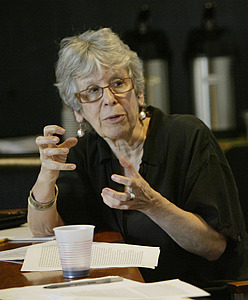The Politics of Academic Freedom is the Subject of Joan Wallach Scott's Lecture at the Institute for Advanced Study

Joan Wallach Scott, Harold F. Linder Professor in the School of Social Science at the Institute for Advanced Study, will present “The Politics of Academic Freedom” on Wednesday, March 30, at 4:30 p.m. in Wolfensohn Hall on the Institute campus.
This talk is based on historical research and on Scott’s experience, from 1993 to 2006, as a member and then chair of the Committee on Academic Freedom and Tenure of the American Association of University Professors. In the lecture, she will explain how the world of the university has not been spared in the current fiercely political climate in the United States. Political groups have called for the firing of professors and the elimination of programs they take to be controversial. Since 9/11, the number of such cases has increased, whether the subject matter pertains to the war on terror, conflicts in the Middle East, religious disputes, or public health and global warming. Academic freedom—the principle of political non-interference in teaching and research—is under siege. But what exactly does this principle entail? What is its history? What are the difficulties faced by those who seek its protection? In the course of the lecture, Scott will examine these questions.
Scott’s groundbreaking work has challenged the foundations of conventional historical practice, including the nature of historical evidence and historical experience and the role of narrative in the writing of history. Broadly, the object of her work is the question of difference in history: its uses, enunciations, implementations, justifications and transformations in the construction of social and political life.
Known internationally for writings that theorize gender as an analytic category, Scott is a leading figure in the emerging field of critical history. Her recent books, including Gender and the Politics of History (1988), Only Paradoxes to Offer: French Feminists and the Rights of Man (1996), Parité: Sexual Equality and the Crisis of French Universalism (2005), and The Politics of the Veil (2007), have focused on the vexed relationship of the particularity of gender to the universalizing force of democratic politics.
Scott received her Ph.D. from the University of Wisconsin in 1969. She was Assistant Professor at University of Illinois at Chicago Circle from 1970–72; Assistant Professor at Northwestern University from 1972–74; and Associate Professor at the University of North Carolina, Chapel Hill from 1974–77 and Professor there from 1977–80. She served as Nancy Duke Lewis University Professor and Professor of History at Brown University from 1980–85. She was the founding director of Brown’s Pembroke Center for Teaching and Research on Women.
Scott was a Member at the Institute for Advanced Study in 1978–79 and joined the Institute Faculty in 1985. She was named Harold F. Linder Professor in 2000. Among her many awards are the American Historical Association’s Herbert Baxter Adams Prize in 1974; the Joan Kelly Prize, also presented by AHA, in 1989; the Hans Sigrist Prize of the University of Bern, Switzerland, in 1999; and the AHA’s Award for Scholarly Distinction in 2009. Scott is also a Fellow of the American Academy of Arts and Sciences.
For further information about the lecture, which is free and open to the public, please call (609) 734-8175, or visit the Public Events page on the Institute website, www.ias.edu.
About the Institute for Advanced Study
The Institute for Advanced Study is one of the world’s leading centers for theoretical research and intellectual inquiry. The Institute exists to encourage and support curiosity-driven research in the sciences and humanities—the original, often speculative thinking that produces advances in knowledge that change the way we understand the world. Work at the Institute takes place in four Schools: Historical Studies, Mathematics, Natural Sciences and Social Science. It provides for the mentoring of scholars by a permanent Faculty of approximately 30, and it ensures the freedom to undertake research that will make significant contributions in any of the broad range of fields in the sciences and humanities studied at the Institute.
The Institute, founded in 1930, is a private, independent academic institution located in Princeton, New Jersey. Its more than 6,000 former Members hold positions of intellectual and scientific leadership throughout the academic world. Thirty-three Nobel Laureates and 40 out of 56 Fields Medalists, as well as many winners of the Wolf and MacArthur prizes, have been affiliated with the Institute.